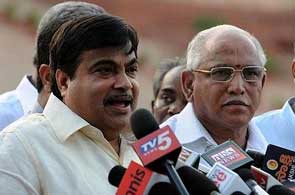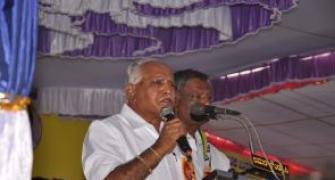 'If the BJP government in Karnataka's activities fostered dissidence, the Gadkari era saw the same sin crop up elsewhere, notably in Uttarakhand.'
'If the BJP government in Karnataka's activities fostered dissidence, the Gadkari era saw the same sin crop up elsewhere, notably in Uttarakhand.'
'Gadkari's leadership saw the BJP drift away from its moral moorings,' argues T V R Shenoy.
2013 is my 48th straight year as a journalist in Delhi. But right now my memory is rolling back the decades, back to when I had been working in the capital for 'just' ten years, specifically to June 12, 1975.
May 8, 2013 started with the results of the Karnataka assembly polls; the day ended with the Supreme Court's strictures against the Union law minister (and his cohorts) making the headlines.
In 1975 too, reporters faced the same problem of plenty -- an assembly election result and an historic court hearing on the same day -- but without the benefits of the Internet and mobile phones, and while both radio (still the principal electronic medium) and television were still 'caged parrots speaking in their masters' voice.'
The ruling referred to was the famous Allahabad high court judgment, wherein Justice Jagmohan Lal Sinha set aside Indira Gandhi's election from Rae Bareli in the 1971 general election.
Indira Gandhi had beaten Raj Narain (fighting on a Samyukta Socialist Party ticket) by the hefty margin of 183,309 to 71,499 votes; undaunted, he had taken on the sitting prime minister in the high court.
Justice Sinha found Indira Gandhi guilty of certain corrupt practices, unseated her, and barred her from contesting any election for six years.
In 2013 as in 1975, the central issue was not an individual's actions but a systemic abuse of power. And, explicitly or implicitly, the prime minister of the day stood condemned in both cases.
What of the second event on that historic twelfth of June? That assembly election has been all but forgotten, but it was eerily reminiscent of today.
Forty years ago middle-class rage was, just like today, being fuelled by a potent combination of corruption and inflation. What would eventually be called the 'Nav Nirman Andolan' started when students at the Lalbhai Dalpatbhai College of Engineering in Ahmedabad protested against a hike in their hostel food bills, which spread to other institutions.
The then chief minister of Gujarat, Chimanbhai Patel, was widely derided as 'Chiman chor', and matters reached the point where Indira Gandhi had to dismiss him. However, the prime minister, having imposed President's Rule, would not dissolve the assembly.
Morarji Desai then went on a fast to force Indira Gandhi's hand. (Shades of Anna Hazare!) She caved in, and the Congress was voted out in favour of a coalition that included the Congress-O, the Jana Sangh, and the Bharatiya Lok Dal; Babubhai Patel became the chief minister.
Corruption and inflation played their parts in the Congress's defeat. But so did the party's attempts at electoral engineering, resulting in an alphabet soup of acronyms. The first of these, as far as I recall, was 'KHAM' (Kshatriya, Harijan, Ahir, Muslim). This was unacceptable to the educated middle class.
The events of May 8, 2013 were split 50-50 between the BJP and the Congress. Both could stand to learn from the earlier events of 1975. The Congress, obviously, should not try to nullify what happened in court by brazening it out. But it is fair to ask if the BJP in turn has learned its lesson.
Inflation is probably beyond the control of any state government. But voters are quick to scent --and resent -- both corruption and caste-engineered politics. The BJP regime in Karnataka committed both sins.
There was a whiff of corruption around the BJP ministry in Karnataka almost from the moment of its inception, but this turned into an ever-present stench when the Lokayukta, Justice Santosh Hegde, exposed major irregularities in the actions of the mining industry.
Prominent among those firms named by the Lokayukta were those associated with the Reddy brothers -- Karunakara, Janardhana, Somashekhara -- of whom the first two were ministers in the BJP government.
That was bad enough, but what was worse was the involvement of B S Yeddyurappa himself, the chief minister. His family was linked in the popular mind with profiteering from unethical land deals in Bengaluru and in Shimoga as well as with the mining scandals.
Adding to the metaphorical stench of corruption was the literal reek of garbage on the streets of Bengaluru. The corporators found little time to deal with civic issues, but somehow had more than enough time to join hands in asking for more tickets to IPL matches played at the Chinnaswamy Stadium.
The BJP took an unconscionably long time in dealing with B S Yeddyurappa and the Reddy brothers, until public outrage after the Lokayukta's report forced their hand. The new chief minister, Sadananda Gowda, began well, by removing the Reddy brothers, but he was in office for less than a year -- and each of those 343 days was plagued by factionalism.
It has never been explained why Sadananda Gowda was replaced by Jagadish Shettar. There was a persistent rumour -- never effectively denied -- that it was done to mollify the influential Lingayat community, which was supposedly smarting over the removal of B S Yeddyurappa, one of its own.
The BJP ministry's wretched run coincided with the equally horrible presidency of Nitin Gadkari. If the B S Yeddyurappa ministry earned scorn for hobnobbing with business magnates, so too did Nitin Gadkari.
If the activities of the BJP government in Karnataka fostered dissidence, the Gadkari era saw the same sin crop up elsewhere, notably in Uttarakhand. Both states would see multiple chief ministers in the course of five years.
Nitin Gadkari's leadership saw the BJP drift away from its moral moorings, weighed down by allegations of corruption and casteism. The final straw was when Nitin Gadkari himself was accused of unethical conduct, but chose to serve out his term as party president rather than step down after the (admittedly unproven in court) allegations.
The party would suffer massive defeats under Nitin Gadkari, losing its ministries in Himachal Pradesh and in Uttarakhand, performing disastrously in Uttar Pradesh, and losing ground in Punjab. And B S Yeddyurappa alleged -- without denial -- that he was promised a deal by Nitin Gadkari.
The BJP could never effectively exploit the issue of corruption as long as Nitin Gadkari was around, and he is still a millstone around the party's neck.
Immediately after the Supreme Court's observations of May 8, 2013, when asked whether Union Law Minister Ashwani Kumar would resign, Digvijay Singh sarcastically enquired, 'Did Gadkariji resign immediately after he was accused of unethical conduct?'
There are obvious differences between a law minister seemingly interfering in an investigation and an Opposition leader cutting private deals, but try explaining that to a public weary of corruption.
A single 'Chiman chor' proved sufficient to effect a Congress defeat in Gujarat in 1975; a 'sab chor hai' attitude was enough for voters to reject Nitin Gadkari's BJP from Himachal Pradesh in the north to Karnataka in the south.
Those in the Sangh Parivar who propelled Nitin Gadkari to power and then kept him perched there need to introspect. A Morarji Desai -- or an Anna Hazare -- has the moral authority to point to flaws in his opponents; a Nitin Gadkari does not have that stature.
The Congress chose to ignore a court judgment in 1975, and it is still brazening out adverse court opinions in 2013. Having followed the Congress path of corruption and caste politics, to its own ruin, will the BJP be able to extract the correct lessons from its losses in Karnataka (and other states)?
The high summer of 1975 ended in the bleakest of winters. I hope India fares better in 2013.
For more columns by Mr T V R Shenoy, please click here
Image: Then BJP president Nitin Gadkari and then Karnataka chief minister B S Yeddyurappa. T V R Shenoy blames both leaders for the BJP's decline at the Centre and in Karnataka.










